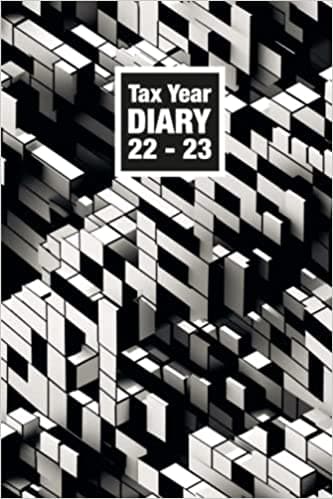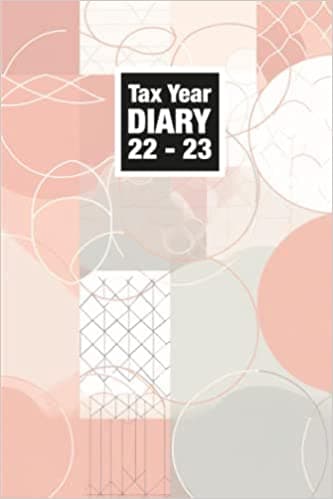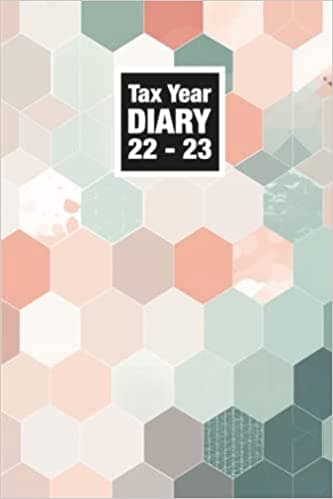Tax Year Diaries
• By Louise

If you're a small business owner, then it's important that you keep track of your income and expenses throughout the year. This will help you stay organised and in control of your cash flow. One great way to do this is by using tax year diaries to record your income and expenses. Our tax year diaries are designed specifically for small business owners, and they come with a range of features that will make tracking your finances easy!
A tax year diary runs from April to April, and can be a helpful tool for tracking your business' income and expenses.
If you're like most small business owners, tracking your income and expenses is vital to keeping your business afloat. But let's face it - it can be a real pain to keep on top of everything, especially if you don't have a dedicated accountant. That's where our Tax Year Diaries come in handy.
This essential tool for small businesses contains a week on two pages layout, with space for you to record income and expenses for each day, week, & month. Plus, it comes in handy A5 size for portability, so you can jot down costs while you're on the go.
Our Tax Year Diaries also include our bestselling accounting ledger pages in the back to help you keep on top of your bookkeeping and cash flow. So why wait? Get ahead of the game and pick up your Tax Year Diary today!
The Importance of Tracking Income and Expenses
Tracking income and expenses is a critical practice for small business owners. By diligently recording financial transactions, you gain valuable insights that can positively impact your business. Firstly, tracking allows you to make informed financial decisions. It provides a clear picture of your revenue streams and expenditures, enabling you to allocate resources wisely and identify areas where you can cut costs or invest more effectively.
Moreover, tracking income and expenses helps you identify trends and patterns. By analysing the data, you can uncover seasonal fluctuations, customer preferences, or product performance. This information empowers you to adjust your strategies, optimise your offerings, and capitalise on opportunities for growth.
Measuring profitability is another significant benefit of tracking. By comparing your income to your expenses, you can determine your business's net profit or loss. This knowledge is essential for assessing your financial health, setting realistic goals, and evaluating the success of your endeavours.
Lastly, accurate and detailed tracking ensures compliance with tax regulations. Come tax time, having well-organised financial records significantly simplifies the process of filing your tax return. You can easily report your income, deduct eligible expenses, and avoid penalties by providing transparent and accurate financial information.
Choosing the Right Tax Year Diary
Selecting the right tax year diary is crucial to streamline your financial tracking process. Consider the following factors when making your choice:
- Size and Layout: Opt for a diary that suits your preferences and needs. Some may prefer a compact pocket-sized diary for convenience, while others may prefer a larger format for more writing space. Choose a layout that allows you to record income and expenses in a manner that is easy to read and navigate.
- Additional Features: Look for a diary with additional features that align with your requirements. Some diaries offer expense categorisation options, allowing you to classify expenditures by type (e.g., office supplies, advertising, utilities) for better analysis. Others may provide reminder functions or integration with accounting software to enhance efficiency.
- Personalisation: Ensure the diary aligns with your business's unique needs and industry. For instance, if you have specific invoicing or billing requirements, look for a diary that accommodates those needs. The more tailored the diary is to your business, the more effective it will be in meeting your financial tracking goals.
Tips for Effective Usage
- Record Accurately: Ensure you record income and expenses accurately and consistently. Double-check entries for accuracy, include relevant details such as dates and descriptions, and maintain a clear and organised format. Accuracy is crucial for reliable financial analysis and tax reporting.
- Dedicate Time: Set aside dedicated time regularly to update your tax year diary. Establish a routine that works for you, whether it's daily, weekly, or monthly. Consistency is key to maintaining up-to-date and comprehensive financial records.
- Leverage Features: Familiarise yourself with the features of your tax year diary and make the most of them. Take advantage of expense categorisation options, utilise reminder functions to stay on top of recording, and explore any integration capabilities with accounting software that can streamline your financial management processes.
- Backup and Security: Protect your financial records by regularly backing up your tax year diary data. Consider using cloud storage or other secure methods to ensure your information is safe from loss or damage.
By following these tips, you can maximise the effectiveness of your tax year diary, stay organised, and gain valuable insights into your business's financial performance.
Still not convinced? Here are some more reasons why our Tax Year Diaries are a must-have for small business owners:
- Track your progress throughout the year: A tax year diary can help you track your progress and growth throughout the year. This is especially important come tax time, when you need to report your income and expenses to the government.
- Stay organised: A tax year diary can help you keep track of all your business' income and expenses in one place. This will save you time and energy come tax time, when you need to gather all your financial information.
- Control your cash flow: A tax year diary can help you keep track of your business' cash flow. This is important in order to avoid any surprises come tax time, when you may need to pay taxes on your income.
- Plan for the future: A tax year diary can help you plan for the future by tracking your business' expenses and income. This will allow you to budget and save for upcoming expenses, such as taxes, equipment, or inventory.
- Avoid surprises: A tax year diary can help you avoid any surprises come tax time. This is because you will have all your business' financial information in one place, and you will be able to track your progress throughout the year.
A tax year diary can be a helpful tool for small business owners. By tracking your business' income and expenses, you can stay organised, control your cash flow, and avoid any surprises come tax time. So if you're looking to keep track of your small business' finances, consider using a tax year diary.
Tax Year Diaries
Looking for an easy and convenient way to track your income and expenses? Look no further than our Tax Year Diary for 2022-2023! This essential tool for small businesses contains a week-on-two-pages layout, with space for you to record income and expenses for each day, week, & month. Plus, it comes in handy A5 size for portability, so you can jot down costs while you're on the go.

Geometric Grey Blocks

Abstract Purple & Gold

Abstract Coral & Grey

Pink & Green Hexagons
Advertisement
